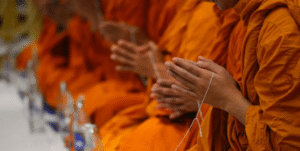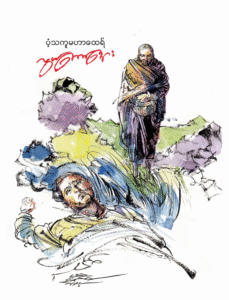Editorial Note: MMNN Commentary reflects the editorial team’s independent Buddhist-humanist perspective point of view by a Myanmar Muslim. It seeks to inspire moral reflection among readers across faiths by drawing lessons from Buddhist teachings relevant to Myanmar’s current reality.
From Narahthu and Ajātasattu to Min Aung Hlaing, history shows how rulers who kill to seize or maintain power walk the path opposite to the Buddha’s teaching — while true Bodhisattas renounce power to prevent suffering.

By DARZKKG
In a nation that proudly calls itself a Buddhist country, it is painful to witness rulers who act against the very principles of Buddhism they claim to protect. Myanmar’s modern generals, the USDP, and their affiliated political leaders often invoke Buddha Sāsana while committing acts that generate endless suffering — dukkha — among their own people.
History, both ancient and sacred, offers powerful lessons. When we compare today’s junta leaders with figures from Buddhist chronicles, the moral difference is unmistakable.
I. The Path of Violence and Power
Min Aung Hlaing and the Modern Junta
Min Aung Hlaing, leader of Myanmar’s military junta, stands accused of ordering the killing of unarmed protesters in the streets, torturing detainees to death, and bombing civilian villages.
These acts are not acts of defense or faith — they are acts of delusion and greed for power.
While the general builds pagodas and speaks of protecting Buddhism, his deeds spread fear, hatred, and grief — all directly opposite to the Dhamma.
Narahthu: The Patricidal King
In the Pagan era, Narahthu murdered his father, King Alaungsithu, to seize the throne. Chronicles recorded his name with shame, warning future rulers that the lust for power invites karmic ruin.
Ajātasattu: The Sinner of the Buddha’s Time
Even during the Buddha’s lifetime, Prince Ajātasattu (Azathadat) of Magadha killed his father, King Bimbisara, under the influence of the corrupt monk Devadatta. Though Ajātasattu later repented and sought forgiveness from the Buddha, his sin condemned him to suffer in hell before redemption. His remorse, however, stands as a lesson — that no throne is worth the stain of blood.

II. The Path of Renunciation and Moral Courage
Prince Siddhattha (The Buddha-to-be)
In contrast, Prince Siddhattha renounced his kingdom, wealth, and even his family — not out of hatred, but compassion. He sought liberation for all beings. He could have ruled as a mighty king, yet he chose to conquer the world’s suffering instead of conquering people.

Temiya Jataka: The Silent Prince
In the Temiya Jataka, one of the Ten Great Jatakas, the Bodhisatta was born as Prince Temiya. Remembering his past life as a king who had wrongly sentenced innocents to death, he pretended to be deaf and dumb for sixteen years to avoid inheriting the throne. His rejection of kingship was not cowardice but supreme moral wisdom — a refusal to repeat the karma of causing harm.
III. The Moral Contrast
| Aspect | Power-Seizing Rulers (Min Aung Hlaing, Narahthu, Ajātasattu) | Renouncing Bodhisattas (Siddhattha, Temiya) |
|---|---|---|
| Motivation | Greed and lust for control | Compassion and moral clarity |
| Method | Killing, oppression, deceit | Renunciation, patience, non-violence |
| Result | Temporary rule, eternal suffering (bad karma) | Moral purity, enlightenment, liberation |
| Impact on Society | Fear, hatred, division | Hope, peace, harmony |
IV. Lessons for Today’s Myanmar
The generals and their political allies claim to defend Buddhism, yet their actions defile it.
The Buddha never endorsed killing, torture, or oppression — not even to preserve religion or rule. He taught that conquering oneself is a greater victory than conquering a thousand enemies.
To truly follow the Dhamma, Myanmar’s leaders must choose the path of Siddhattha and Temiya — not Thihathu or Ajātasattu.
To kill one’s own citizens is to destroy the moral foundation of both the nation and the faith itself.
Only when power bows before compassion can Myanmar truly call itself a Buddhist land.
Editorial Note:
MMNN Commentary reflects the editorial team’s independent Buddhist-humanist perspective point of view by a Myanmar Muslim. It seeks to inspire moral reflection among readers across faiths by drawing lessons from Buddhist teachings relevant to Myanmar’s current reality.






